Planning a trip to Qatar starts with understanding the right visa. The country has introduced several options, from the popular Tourist Visa (A1) to the Visa on Arrival for eligible travelers. Each visa type has its own requirements, fees, and processing steps that can confuse first-time visitors. In this guide, you’ll find a clear, step-by-step explanation of the Qatar Tourist Visa, its types, and the application process so you can focus more on enjoying Qatar’s culture, attractions, and world-class hospitality, rather than worrying about paperwork.
Types of Qatar Tourist Visas
Qatar offers different tourist visa options depending on your nationality, travel purpose, and length of stay. Each category has its own rules, benefits, and conditions. Choosing the right visa helps avoid delays and ensures a smooth entry into Qatar. Below is a detailed look at the main tourist visa types available.
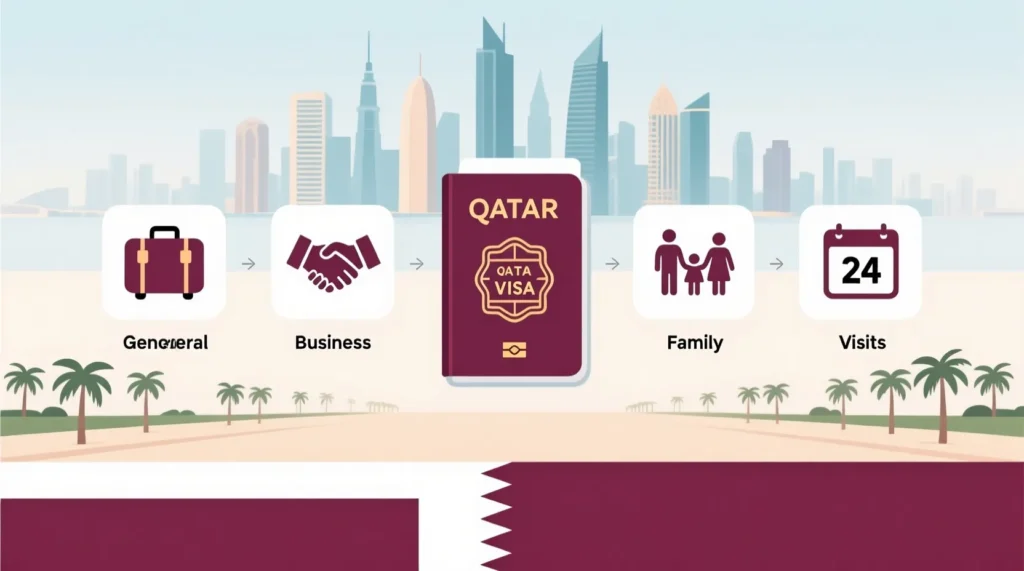
1. Tourist Visa Single Entry (A1)
The A1 visa is the most common choice for travelers visiting Qatar for leisure or short stays. It allows a single entry and is valid for a specific duration, usually up to 30 days. To apply, you need a valid passport, recent digital photo, confirmed flight ticket, and proof of accommodation such as a hotel booking or invitation letter. Many travelers prefer this option because it’s straightforward and designed specifically for tourists. It’s especially useful if you plan to explore Qatar’s attractions, like the Museum of Islamic Art or Souq Waqif before continuing your journey elsewhere.
2. GCC Resident Visa (A2)
If you are a resident of a Gulf Cooperation Council (GCC) country, such as Saudi Arabia, the UAE, Oman, Kuwait, or Bahrain—you may qualify for the A2 visa. This visa is designed to make travel easier for GCC residents and their families. The process is usually faster, and the requirements are lighter compared to standard tourist visas. For example, you may only need to show your GCC residency card along with a valid passport and travel details. This category reflects Qatar’s strong ties within the region and helps frequent visitors move across borders with ease.
3. Visa on Arrival (F1)
For citizens of over 90 countries, Qatar provides the convenience of a Visa on Arrival. This means you don’t need to apply in advance, you simply arrive at Hamad International Airport and obtain the visa at immigration. The stay is typically valid for 30 days and can often be extended. Travelers from countries such as the UK, the US, EU nations, Canada, and Australia benefit most from this facility. While convenient, you still need to carry essential documents like return tickets, hotel reservations, and sufficient funds to support your stay. The Visa on Arrival is one of Qatar’s most traveler-friendly options, encouraging tourism and short business trips.
4. Electronic Travel Authorization (A3)
The A3 visa, or Electronic Travel Authorization (ETA), is meant for travelers who already hold a residence permit or visa for countries like the US, UK, Canada, Australia, or New Zealand. It acts as a pre-approval for travel to Qatar and can be applied for online. The process is faster than a standard visa application and provides additional flexibility for international travelers who already have strong travel credentials. This system is part of Qatar’s effort to simplify global connectivity and support travelers with valid long-term visas elsewhere.
5. Qatar eVisa (for short-term visits)
The Qatar eVisa is a fully digital visa option that can be applied for online before your trip. It is commonly used by tourists who want a hassle-free process without visiting an embassy or consulate. The eVisa usually allows stays of 30 days and requires you to upload scanned copies of your passport, recent photograph, flight details, and hotel booking. Since everything is handled electronically, processing times are often shorter, and travelers receive their approved visa by email. The eVisa has become increasingly popular for its convenience and accessibility, especially for tech-savvy travelers who prefer digital solutions.
Additional Requirements for Specific Nationalities
While Qatar Tourist Visa requirements are similar for most travelers, certain nationalities need to meet extra conditions. These additional steps ensure compliance with Qatar’s entry rules and often reflect regional agreements or travel patterns. Below are the most common nationality-based requirements.
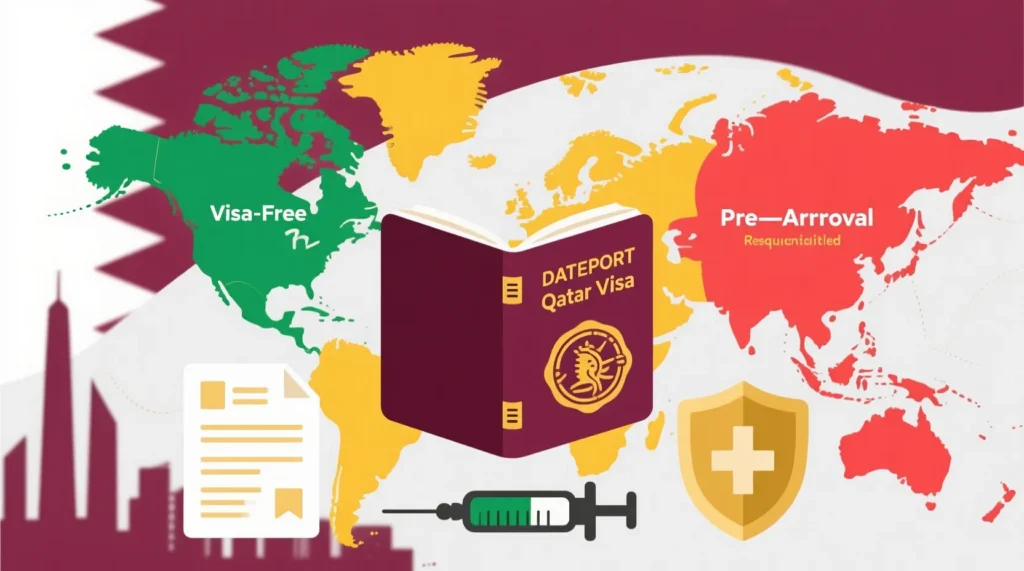
For Indian Citizens
Indian passport holders are among the largest groups of visitors to Qatar, whether for tourism, business, or family visits. Indian citizens can apply for a Qatar eVisa or, in many cases, benefit from the Visa on Arrival facility.
Extra requirements may include:
- Confirmed hotel booking through an approved platform like Discover Qatar.
- Return flight ticket with the same airline they arrived on (strictly checked at Hamad International Airport).
- Bank balance proof: Authorities may require a minimum balance (₹70,000 – ₹100,000 INR is recommended) in the last 3 months.
- For long stays, travel insurance covering medical emergencies is advised.
Tip: Indians holding valid visas or residence permits for the US, UK, Schengen area, Canada, Australia, or New Zealand are eligible for faster processing under the Electronic Travel Authorization (A3) system.
For GCC Residents
Residents of Saudi Arabia, UAE, Kuwait, Oman, and Bahrain enjoy simplified entry to Qatar. If you hold a valid GCC residence permit, you can often apply online and receive approval within 48–72 hours.
Requirements include:
- Valid GCC residence permit (at least 6 months validity).
- Occupation check: Some professions may be restricted, while professionals like doctors, engineers, teachers, and managers get priority approval.
- Family dependents (spouse, children) may also apply under the same residency.
Tip: GCC residents traveling frequently should always carry both their original GCC ID card and passport when entering Qatar.
For South Asian Travelers (Pakistan, Bangladesh, Nepal, Philippines, Sri Lanka)
Travelers from these countries often face stricter document checks due to high migration flow. Qatar does allow them to apply for Tourist Visas and in some cases Visa on Arrival, but the screening is detailed.
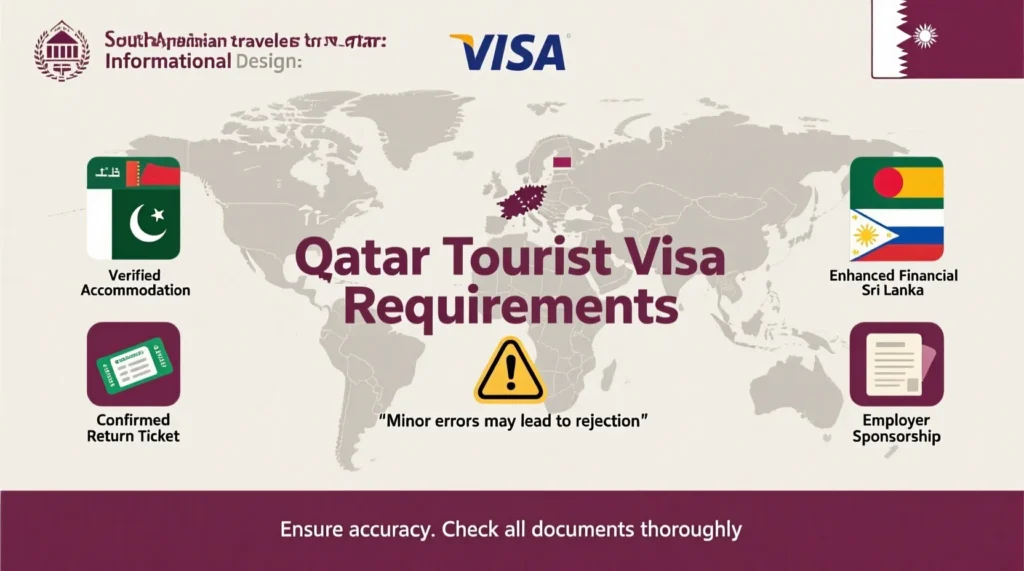
Requirements include:
- Confirmed hotel booking in advance (walk-in hotel bookings are not accepted).
- Return/onward ticket must be confirmed and non-refundable.
- Employment proof from home country (salary slip or company letter) may be requested.
- Sufficient funds: Bank statement showing stable financial history.
- Travel insurance with medical coverage is often recommended for smoother entry.
Tip: Pakistan and Nepal passport holders should check Qatar MOI (Ministry of Interior) updates before booking, as rules change frequently for South Asian countries.
For EU, US, and UK Travelers
Citizens of European Union nations, the United States, and the United Kingdom enjoy some of the most flexible entry policies in Qatar. Most qualify for the Visa on Arrival (F1), which is free of charge for short visits.
Requirements include:
- Valid passport (at least 6 months validity).
- Hotel booking or proof of stay.
- Return ticket or onward travel booking.
- In some cases, travel insurance may be asked at immigration.
Tip: Travelers from these regions often combine their Qatar visit with a stopover in Doha while flying with Qatar Airways. Booking a Qatar Stopover Package not only secures visa approval but also includes discounted hotel stays.
Qatar Visa on Arrival – Who Qualifies?
Qatar’s Visa on Arrival (F1) program is one of the most traveler-friendly policies in the Gulf region. It allows eligible citizens to enter without applying in advance, making it especially useful for tourists, business travelers, and those on stopovers with Qatar Airways.
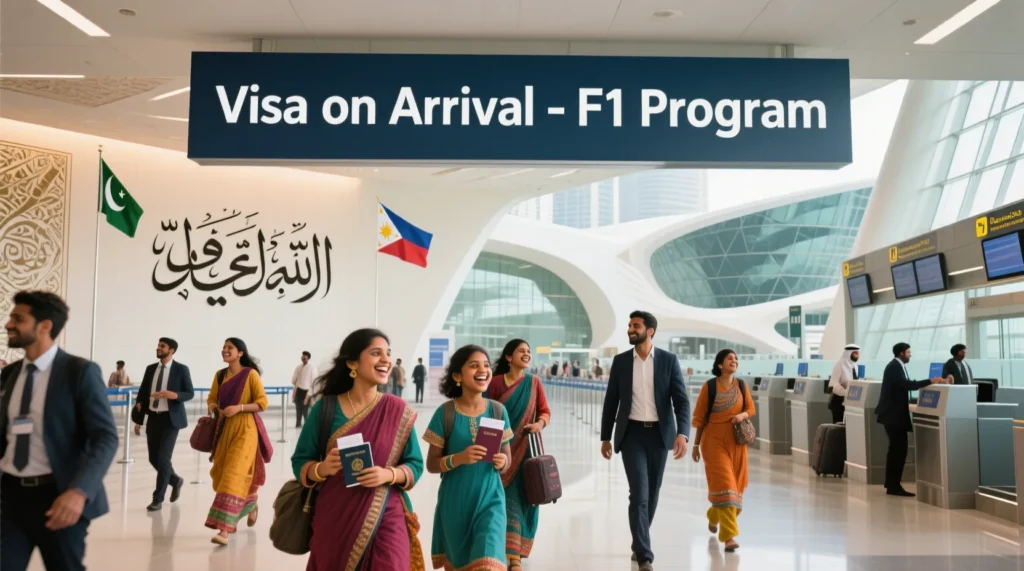
Eligible Countries List
Currently, citizens of over 90 countries can obtain a visa on arrival at Hamad International Airport in Doha. This includes most of Europe, the United States, the United Kingdom, Canada, Australia, New Zealand, and several Asian and Latin American nations.
- 90-day stay (multiple entry): Nationals of Schengen Area countries, the UK, Turkey, and a few others.
- 30-day stay (extendable by another 30 days): Nationals of the US, Canada, Australia, India (with certain conditions), and most Latin American countries.
Note: The list is updated by the Qatar Ministry of Interior (MOI), so travelers should always confirm eligibility before departure.
Requirements at Immigration
Even if you are from an eligible country, you must still meet basic entry conditions to be granted a Visa on Arrival:
- Passport validity of at least 6 months.
- Confirmed return or onward ticket (airlines often check before boarding).
- Proof of accommodation: hotel booking via Discover Qatar or an invitation letter if staying with family.
- Sufficient funds: Although not always checked, travelers should carry a credit card or recent bank statement.
- Clean travel history: Visitors previously denied entry to Qatar or deported from GCC countries may face stricter checks.
Immigration officers may also request travel insurance with health coverage, especially for long stays.
Duration of Stay & Extension Process
- 30-day Visa on Arrival: Most travelers receive this version, with the option to extend for another 30 days online through the MOI portal or at immigration offices in Doha.
- 90-day Visa on Arrival: Limited to select nationalities (such as EU/UK/Schengen passport holders). Usually valid for multiple entries within the period.
- Extension fees: A small service fee may apply when extending the visa, payable online.
Tip: If you plan to extend, apply for the extension at least 3–4 days before expiry. Overstaying can lead to fines of QAR 200 per day, and repeat overstays may affect future visa approvals.
Qatar eVisa: Effortless Access for Short-Term Visits
The Qatar eVisa is a fully digital travel authorization that makes visiting Qatar simple and convenient. Instead of visiting an embassy or waiting in long queues, travelers can apply online, upload documents, and receive their visa by email. This system reflects Qatar’s push for digital transformation and its goal of welcoming more tourists ahead of major international events.

What is an eVisa?
An eVisa is an electronic version of a travel visa that can be applied for and processed online. For Qatar, it is usually valid for 30 days and allows single entry for tourism, leisure, and short business trips. Once approved, the eVisa is linked directly to your passport number, which immigration officers can verify at Hamad International Airport.
Purposes of Entry under eVisa
The Qatar eVisa is mainly designed for:
- Tourism: Visiting attractions like Souq Waqif, Katara Cultural Village, Pearl-Qatar, and the National Museum of Qatar.
- Family Visits: If invited by a resident or Qatari national.
- Short Business Meetings: Attending events, trade shows, or conferences.
- Stopovers: Passengers flying with Qatar Airways often use the eVisa for a 2–4 day Doha stopover before heading to their next destination.
How to Apply for Qatar eVisa Online
Applying for a Qatar eVisa is a straightforward process that can usually be completed in less than 20 minutes:
- Visit the official portal: Ministry of Interior (MOI) website or Discover Qatar.
- Fill out the form: Enter passport details, travel dates, and personal information.
- Upload documents: Passport scan, digital photo, flight booking, and hotel confirmation.
- Pay the visa fee: Usually between QAR 100–150, depending on nationality.
- Wait for processing: Most eVisas are approved within 3–5 working days.
- Receive via email: Print a copy and also keep a digital version on your phone.
Tip: Double-check that your uploaded passport scan is clear and shows all details. Many rejections happen due to poor-quality document uploads.
Benefits of eVisa Compared to Other Types
The Qatar eVisa has several advantages over traditional visa options:
- Convenience: Apply from anywhere in the world without visiting an embassy.
- Faster Processing: Approvals often within a few days compared to weeks for embassy visas.
- Digital Access: No need to carry physical paperwork immigration verifies it electronically.
- Predictable Approval: Unlike Visa on Arrival, where eligibility is checked at the airport, the eVisa gives you confirmed entry before you travel.
- Ideal for Stopovers: Travelers flying with Qatar Airways can plan short city breaks in Doha without worrying about paperwork delays.
Qatar Tourist Visa Extensions & Renewals
If you wish to stay in Qatar longer than your initial visa allows, you can apply for a visa extension. The process is simple and can be done online through the Ministry of Interior (MOI) website or by visiting an MOI service center.
- Eligibility: Most tourist visas can be extended for up to 30 additional days, depending on your nationality.
- Where to Apply:
- Online at MOI’s official portal.
- In person at MOI service centers across Qatar.
- Required Documents:
- Original passport (valid for at least 6 months).
- Current visa copy.
- Proof of accommodation (hotel booking or host details).
- Payment for extension fee (usually QAR 100 per additional month).
- Processing Time: Usually within a few minutes if applied online, or the same day at service centers.
Tip: Always apply for an extension before your visa expires. Overstaying can result in fines of QAR 200 per day.
Qatar Tourist Visa Rejection – Common Reasons & How to Avoid Them
Even with proper planning, some travelers face visa rejections. Understanding why visas get denied and taking preventive measures can save time, money, and stress. Qatar’s Ministry of Interior (MOI) enforces strict rules to ensure all visitors meet entry standards.
1. Incomplete or Incorrect Application
Submitting an incomplete application is one of the most common reasons for rejection. This includes missing fields, incorrect passport numbers, or typos in personal information.
How to Avoid:
- Double-check all details before submission.
- Use the exact name as written on your passport.
- Ensure your travel dates match your flight bookings.
Example: An Indian traveler applied for a Tourist Visa (A1) but mistyped the passport number. The visa was delayed and eventually rejected. Correcting such errors early saves time.
2. Low-Quality or Incorrect Documents
Blurry passport scans, incorrect photo size, or unverified hotel bookings can lead to rejection. Qatar MOI is strict about document quality.
How to Avoid:
- Use high-resolution passport scans.
- Ensure your digital photo meets ICAO standards (plain background, full face visible).
- Book hotels through approved platforms like Discover Qatar to guarantee acceptance.
3. Insufficient Financial Proof
Qatar authorities want to confirm that you can support your stay. Travelers without clear bank statements or proof of funds risk rejection.
How to Avoid:
- Maintain a stable bank balance in the last 3–6 months.
- Include credit card statements if needed.
- Ensure that funds are sufficient to cover hotel, food, transport, and emergencies.
Example: A traveler from Pakistan was denied the eVisa because their bank balance did not show sufficient funds for a 30-day stay.
4. Invalid or Expired Passport
Your passport must be valid for at least 6 months from your arrival date. Passports near expiry are a major cause of rejection.
How to Avoid:
- Renew your passport well before applying.
- Check that at least two blank pages are available for immigration stamps.
5. Misalignment of Travel Purpose
Applying for a tourist visa while intending to attend business conferences, work, or study can lead to immediate denial. MOI checks travel purpose against visa type.
How to Avoid:
- Apply for the correct visa type (Tourist, Business, eVisa, A1, F1).
- Include supporting documents like flight tickets, hotel reservations, or event invitations.
- Avoid mixing travel purposes under a tourist visa.
6. Previous Immigration Violations
Travelers who overstayed or were deported from Qatar or other GCC countries may face rejection. Immigration records are cross-checked electronically.
How to Avoid:
- Always leave Qatar before your visa expires.
- Pay any pending fines if you overstayed previously.
- Keep documentation of prior departures to show compliance.
7. Tips for Smooth Visa Approval
- Apply 2–3 weeks before travel to allow time for corrections.
- Use professional services if unsure about document formatting.
- Keep all documents organized digitally and physically.
- Follow updates on the Qatar MOI website for policy changes.
Tips for a Smooth Qatar Visa Application
A smooth visa application can save time, reduce stress, and improve approval chances. Follow these key tips to avoid common mistakes and ensure your Qatar Tourist Visa is processed without issues.

Double-Check Document Format & Size
Ensure all documents meet Qatar MOI standards. Passport scans must be clear, and digital photos should follow ICAO guidelines with a plain background and fully visible face. Hotel confirmations and flight tickets must match your travel dates exactly. Small errors in document format or quality often lead to delays or rejections.
Apply at Least 2 Weeks Before Travel
Even though Qatar eVisa and Visa on Arrival are processed quickly, applying early provides a buffer for corrections or unforeseen issues. Submitting your application at least two weeks before departure ensures peace of mind and allows extra time for document verification.
Keep Hotel Booking Confirmation Handy
Always have a printed or digital copy of your hotel booking. Immigration officers at Hamad International Airport may verify your accommodation. Booking through approved platforms like Discover Qatar ensures your confirmation is accepted and reduces the risk of delays.
Use Professional Visa Service for Error-Free Application
If you are unfamiliar with the visa process, using a professional visa service can prevent mistakes. Approved partners guide you through document preparation, payment, and submission, ensuring your application complies fully with Qatar MOI requirements.
Discovering Qatar: A Land of Contrasts & Enchantment
Qatar is a small country with a big personality. From modern skyscrapers in Doha to the vast deserts of Al Shahaniya, Qatar blends tradition and modernity like no other place. Visitors can explore cultural landmarks, luxury attractions, and natural landscapes, making it a unique destination in the Middle East.

Top Tourist Attractions in Qatar
Qatar is home to many iconic landmarks that every traveler should visit:
- Museum of Islamic Art (MIA): Houses one of the world’s most impressive collections of Islamic art.
- Souq Waqif: A bustling marketplace offering spices, textiles, and traditional Qatari crafts.
- The Pearl-Qatar: A luxury man-made island with shopping, dining, and beautiful marina views.
- Katara Cultural Village: A hub for arts, music, and cultural festivals.
- Inland Sea (Khor Al Adaid): A breathtaking desert landscape where sand meets the sea.
These sites provide a mix of history, culture, and luxury, reflecting Qatar’s diverse offerings.
Things to Do for Tourists
Qatar offers experiences beyond sightseeing:
- Desert Safari: Explore dunes on a 4×4 adventure or enjoy traditional Bedouin-style camps.
- Dhow Cruise: Sail along Doha’s Corniche on a traditional wooden boat while enjoying skyline views.
- World Cup Stadium Tours: Visit state-of-the-art stadiums built for FIFA 2022.
- Art & Cultural Tours: Explore public art installations, galleries, and museums around Doha.
- Shopping & Dining: From luxury malls like Villaggio Mall to local eateries in Souq Waqif.
These activities cater to both adventurers and leisure travelers, making Qatar a versatile destination.
Cultural Etiquette for Travelers
Understanding Qatari customs and traditions is essential for a respectful visit:
- Dress modestly, especially in public places and religious sites.
- Avoid public displays of affection.
- Always ask permission before photographing locals.
- During Ramadan, avoid eating, drinking, or smoking in public during daylight hours.
- Learn basic greetings like “As-salamu alaykum” to show respect.
Following these guidelines ensures a smooth, culturally aware experience and leaves a positive impression on locals.
Frequently Asked Questions (FAQs)
How to get a tourist visa in Qatar?
You can obtain a Qatar Tourist Visa either online through the Ministry of Interior (MOI) eVisa portal or via Visa on Arrival if you are from an eligible country. The process involves filling out your personal details, uploading your passport and photo, and providing proof of accommodation and return flight. Using approved platforms like Discover Qatar ensures a smooth application.
How much is a Qatar tourist visa?
The cost varies by nationality and visa type. Typically, a single-entry tourist visa ranges from QAR 100 to QAR 150 (approximately USD 27–41). Fees may differ slightly depending on whether you apply online or use a travel partner.
How do I apply for a tourist visa?
Apply online through the Qatar MOI eVisa portal:
- Fill in your personal details.
- Upload passport, digital photo, and supporting documents.
- Pay the visa fee online.
- Wait for approval, which usually takes 3–5 working days.
How much will a tourist visa cost?
For most travelers, a single-entry visa costs around QAR 100–150. Multi-entry visas or extensions may incur additional fees. Always check the latest fees on the official MOI website before applying.
Is Qatar expensive to visit?
Qatar is considered moderately expensive. Luxury hotels, fine dining, and high-end shopping can increase costs, while budget travelers can manage with affordable hotels, local eateries, and public transport. Attractions like Souq Waqif, Katara Cultural Village, and the Corniche are free or low-cost.
Can Nigerians get a visa on arrival in Qatar?
Yes, Nigerian citizens can get a Visa on Arrival if they meet eligibility criteria, including a valid passport, return ticket, and proof of accommodation. However, some travelers may prefer applying for an eVisa in advance to avoid delays at Hamad International Airport.
How to apply for a visit visa?
The visit visa is applied similarly to a tourist visa:
- Apply online via the MOI portal.
- Upload your passport, photo, and accommodation proof.
- Pay the visa fee.
- Wait for approval.
For family visits, an invitation letter from a resident or Qatari national may be required.
How many months is the tourist visa for Qatar?
Most tourist visas allow a stay of 30 days, with the option to extend for another 30 days. Certain nationalities, like EU/UK citizens, may get 90-day multiple-entry visas. Extensions are applied through the MOI online portal.
What are the requirements for a visa?
Requirements typically include:
- Passport valid for at least 6 months.
- Recent digital photo meeting ICAO standards.
- Confirmed hotel booking or host invitation.
- Return or onward flight ticket.
- Sufficient funds for the duration of stay.
Travel insurance is recommended for longer stays or certain nationalities.
How much is a visit visa for Qatar for 30 days?
The standard 30-day visit visa costs around QAR 100–150 (USD 27–41). This applies to most nationalities eligible for tourist or visit visas. Extension fees for an additional 30 days may also apply.
How long to stay in Doha?
Most travelers stay 3–5 days in Doha to explore key attractions like Museum of Islamic Art, Souq Waqif, Katara Cultural Village, and The Pearl-Qatar. Longer stays (up to 30 days) are possible with a tourist visa, allowing for day trips to the desert (Khor Al Adaid) or surrounding towns.
Conclusion:
Obtaining a tourist or visit visa for Qatar is a straightforward process when you follow the official guidelines. Whether you apply online via the MOI eVisa portal or use Visa on Arrival (if eligible), ensuring that all required documents are ready will make your travel experience smooth and hassle-free. Planning your stay, understanding costs, and knowing the visa requirements in advance can help you enjoy Qatar’s rich culture, modern attractions, and unique experiences without any stress.
As a traveler and immigration consultant, I have personally guided clients through this process multiple times. From my experience, careful preparation and following official procedures make all the difference in having a seamless visit to Qatar.

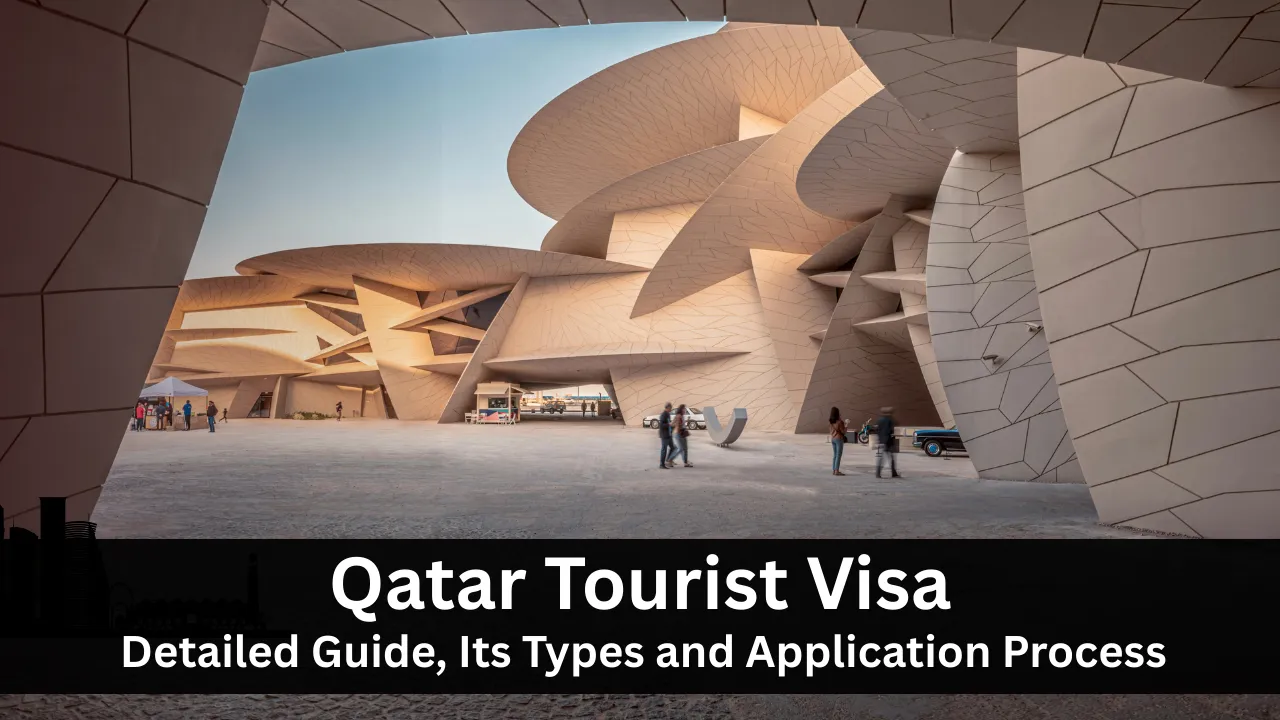


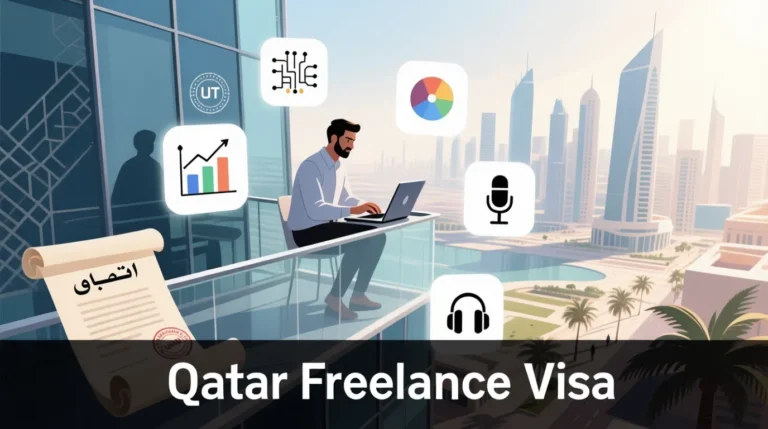

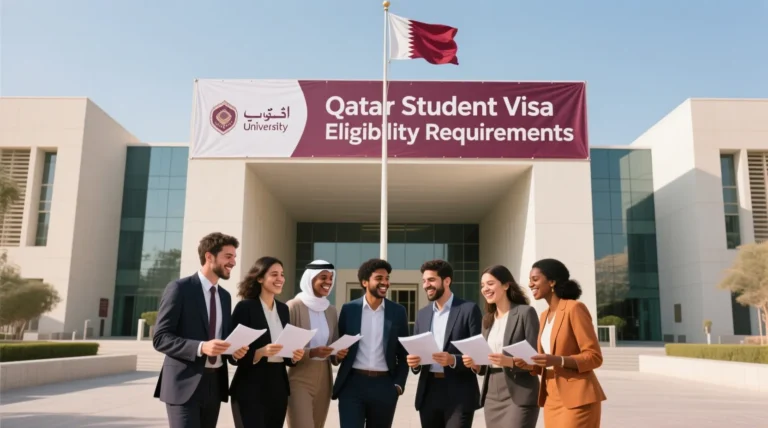
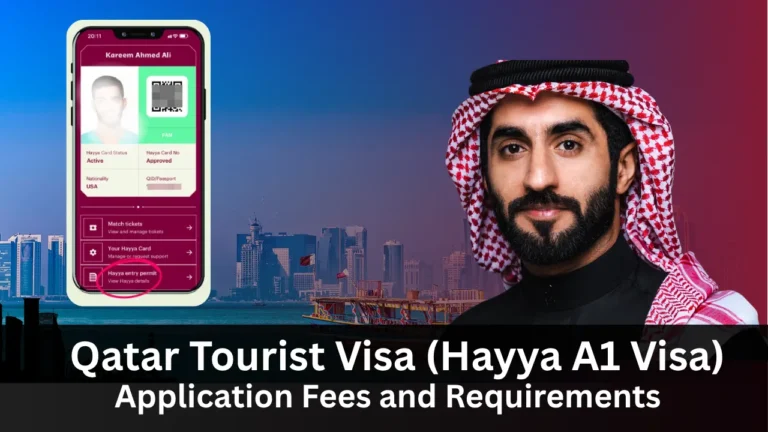
4 Comments